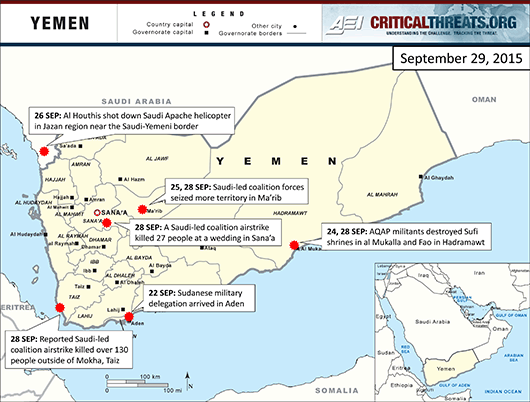Al Qaeda in the Arabian Peninsula (AQAP) and the Islamic State in Iraq and al Sham (ISIS) continue to expand in Yemen, exploiting the Saudi Arabia-led coalition’s preoccupation with securing northern Yemen.
AQAP and ISIS increased their political and military activities to boost recruitment during the Eid al Adha holiday. AQAP militants conducted several political and military activities throughout Yemen from September 17 to September 24, destroying Sufi shrines in Hadramawt, distributing religious pamphlets in Hadramawt and Aden, and attacking al Houthi locations in Ibb. An AQAP video commemorated the group’s recent southern battles against the al Houthis and a statement praised Muslims celebrating the holiday. AQAP senior official Khalid Batarfi expressed support for Eid al Adha participants and called for more attacks against the Zionist-Crusaders in a September 28 video. Separately, ISIS groups in Yemen increased their reported activity. ISIS Wilayat al Bayda claimed an improvised explosive device attack against a pro-al Houthi Yemeni military patrol on September 22 and was reportedly preparing to train fighters after the holiday. A September 24 suicide bombing attack at a Sana’a mosque claimed by ISIS Wilayat Sana’a was an attempt to inflame Sunni-Shi’a tensions during the religious holiday. (Sources available upon request.)
Growing domestic and international criticism of the Saudi-led coalition’s bombing campaign threatens to undermine its military campaign in Yemen. Saudi-led coalition forces transferred more troops and military equipment to Ma’rib as coalition planes continued an intensive bombing campaign against al Houthi sites in northern and central Yemen. Coalition forces seized more territory in Ma’rib on September 25 and September 28 and destroyed several al Houthi ballistic missile sites in central Yemen on September 27. The al Houthis shot down an Apache helicopter near the Saudi Arabia-Yemen border on September 26. Strong public backlash against the bombing campaign’s high civilian casualties in Hajjah, Taiz, and Sana’a will challenge support for the coalition. Humanitarian organizations and international officials, including Amnesty International and UN Secretary General Ban Ki-moon, condemned the coalition’s bombing campaign despite Saudi Arabia’s efforts to deny responsibility and deflect criticism. Separately, senior Yemeni and Saudi officers announced that coalition forces were preparing to begin operations to liberate al Jawf and Sana’a on September 28 and September 29.
Sudan’s support for the Saudi-led coalition places Khartoum firmly in Riyadh’s sphere of influence. Sudan had already begun breaking long-standing ties with Iran by the end of last year and joined the coalition in April. The September 18 announcement that Sudan was prepared to deploy a battalion to support the Saudi-led coalition following Yemeni President Abdu Rabbu Mansour Hadi’s meetings with Sudanese officials in August showed Sudan’s commitment to support Saudi Arabia. A Sudanese military delegation arrived in Aden and discussed training local security forces with Yemeni military officials on September 22. Sudanese President Omar al Bashir praised the Saudi-led coalition’s successes in Yemen and the Sudanese forces that participated in Operation “Decisive Storm” in a September 24 speech. On September 29, Yemeni southern resistance members commended Sudan’s treatment of wounded southerners in Sudanese hospitals and called for the Yemeni government to commit more resources to treating wounded southerners.
Hadi’s government, the Saudi-led coalition, and the al Houthis and their allies continue efforts to resolve the ongoing conflict. On September 21, Saudi sources reported that the Saudi Shura Council would send a delegation to Russia to build support for the Saudi-led coalition. Separately, al Houthi officials met with the German ambassador to Yemen, Walter Hasman, in Muscat, Oman to discuss Yemen’s ongoing conflict on September 28. Finally, Hadi discussed the Yemeni conflict at the UN General Assembly and in a meeting with the British Secretary of State for Foreign and Commonwealth Affairs Philip Hammond in New York City on September 29.
AQAP and ISIS will continue to leverage the Saudi-led coalition’s strict focus on the al Houthis to boost recruitment in recently liberated territories. The coalition’s ability to address growing criticism will determine the effectiveness of its military campaign and its bargaining power in future negotiations with the al Houthis.
← PREVIOUS |
NEXT → |

